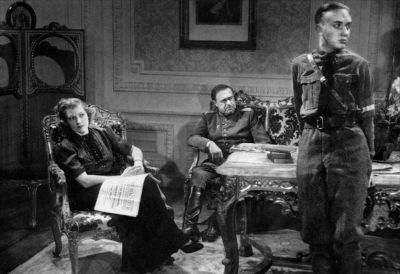
APRÈS MEIN KAMPF, MES CRIMES
(My Crimes After Mein Kampf, Francia/1939)
R.: Alexandre Ryder. D.: 84'. V. francese. Digitale
T. int.: My Crimes After Mein Kampf. Scen.: José Lacaze. F.: Géo Blanc. Mus.: Wladyslaw Eiger. Int.: Roger Karl (il colonnello), Pierre Labry (Röhm), André Valmy (Ernst), Albert Morys (Hitler giovane), Line Noro (Frieda), Nicolas Amato (sottotenente), Alain Cuny (Van der Lubbe). Prod.: Films Régent
Digibeta. D.: 84'. Bn. Versione Francese / French Version
Da: Archives Films Régent - Archives Jacques Haïk
Non avevo assolutamente idea degli orrori e dei tradimenti che avrei scoperto facendo questo film. Abbiamo ricostruito delle scene emozionanti con autentici brani d'archivio: la notte di San Bartolomeo nazista, l'assassinio di Röhm, quello del generale Von Schleicher e di sua moglie, la messa in stato d'accusa di Van der Lubbe, ruolo interpretato da Cuny, accusato dell'incendio del Reichstag [...]. Tutte le scene di ricostruzione di carattere documentario sono state girate in in- terni reali. Abbiamo girato soltanto un
giorno in studio. L'assassinio di Röhm è stato girato nella cantina di una villa; Pierre Labry è stato truccato in modo da somigliare allo sfortunato ex collaboratore del Führer, compresa la cicatrice che gli segnava il volto.
Alexandre Ryder, intervista a cura di Doringe, "Pour vous", n. 573, 8 novembre 1939
Attenzione, film-ufo. Après Mein Kampf, mes crimes è un docu-fiction realizzato quando il termine non esisteva. Un film mediocre, anche ridicolo, ma un documento storico appassionante. Dopo la dichiarazione di guerra del go- verno Daladier alla Germania nazista, nel settembre 1939, il Commissariato dell'informazione chiese al regista Alexandre Ryder (noto all'epoca per le sue commedie musicali!) di girare un film contro Hitler. Ryder, che per l'occasione adottò lo pseudonimo simbolico di Jean-Jacques Valjean, vi si consacrò con la delicatezza degna di un attacco di panzer. Il suo montaggio alterna sequenze d'attualità a episodi esageratamente melodrammatici con attori (fra i quali Alain Cuny nei panni di un incendiario del Reichstag) che rievoca- no la giovinezza del Führer, la persecuzione degli ebrei, la notte dei lunghi coltelli (chiamata incongruamente 'la notte di San Bartolomeo nazista'), la delazione in seno alle famiglie... Particolare inquietante, Ryder denuncia le colpe della propaganda di Goebbels proprio mentre ne adotta le medesime strategie, manipolazioni di immagini e slogan grossolani inclusi.
Uscito nel marzo del 1940, tre mesi più tardi il film fu proibito, dopo l'occupazione della Francia. Le copie furono sequestrate e poi distrutte ma il produttore Jacques Haïk riuscì a salva- re l'essenziale del negativo. Après Mein Kampf, mes crimes ebbe così diritto a una seconda esistenza nel 1945, con l'aggiunta di un epilogo di una dozzina di minuti sui campi di sterminio e la caduta di Berlino.
Samuel Douhaire, Après Mein Kampf, mes crimes, "Télérama", 11 ottobre 2008
I had absolutely no idea about the horror and treachery I would discover in making this film. We reconstructed powerful scenes with authentic archive materials: the Nazi St. Bartholomew's Night, the assassinations of Röhm and of General Von Schleicher and his wife, the indictment of Van der Lubbe, a part played by Cuny, the pseudo arsonist of the Reichstag [...]. All the reconstructed documentary scenes were shot in real locations. We only shot one day in the studio. Röhm's assassination was shot in the basement of a villa; Pierre Labry's make-up was done in a way to make him resemble the Führer's unfortunate comrade, including the scars on his face.
Alexandre Ryder, interview by Doringe, "Pour vous", n. 573, November 8, 1939
Warning, UFO-film. Après Mein Kampf, mes crimes is a docu-fiction that was made before the term even existed. A film that is mediocre verging on ridiculous but also a fascinating historical document. After the Daladier government declared war on Nazi Germany, in September 1939, the Commissariat à l'Information asked director Alexandre Ryder (known at the time for his musical comedies!) to make a film against Hitler. Ryder, who used the symbolic pseudonym Jean-Jacques Valjean for the film, devoted himself to it with the delicacy of a Panzer attack. He alternated sequences of current events with overly melodramatic scenes with actors (including Alain Cuny as the Reichstag arsonist) of the young Führer, the persecution of the Jews, the Night of Long Knives (wrongly called 'the Nazi St. Bartholomew's Night'), denunciation within families... A disturbing detail, Ryder criticizes Goebbels's propaganda while employing the very same strategies, image manipulation and common slogans included.
The film came out in March 1940; three months later it was prohibited once France was occupied. Copies were sequestered and destroyed, but the producer Jacques Haïk managed to salvage most of the negative. Thus Après Mein Kampf, mes crimes had a second life in 1945, with the addition of an epilogue on the extermination camps and the fall of Berlin.
Samuel Douhaire, Après Mein Kampf, mes crimes, "Télérama", October 11, 2008
Tariffe:

Numero posti: 144
Aria condizionata
Accesso e servizi per disabili
Il nostro cinema aderisce al circuito CinemAmico: è possibile utilizzare l’applicazione MovieReading® per i film di cui è prevista audiodescrizione e/o sottotitolazione sull'applicazione.
Tel. 0512195311











